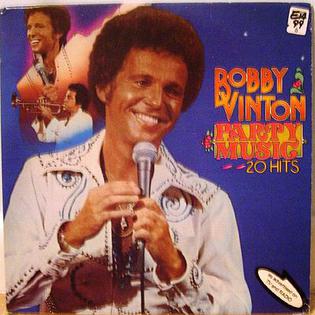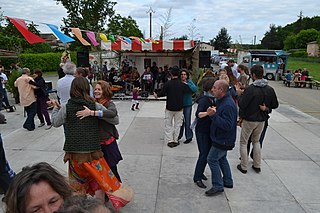| Last Orders | |
|---|---|
 | |
| Studio album by | |
| Released | July 2007 |
| Recorded | 2007 |
| Genre | Folk |
| Label | Fellside |
| Producer | Paul Adams |
Last Orders is the debut self-titled album from English folk band Last Orders. It was released in July 2007 by Fellside Records.
| Last Orders | |
|---|---|
 | |
| Studio album by | |
| Released | July 2007 |
| Recorded | 2007 |
| Genre | Folk |
| Label | Fellside |
| Producer | Paul Adams |
Last Orders is the debut self-titled album from English folk band Last Orders. It was released in July 2007 by Fellside Records.
All songs Traditional; except where noted.
The polka is originally a Czech dance and genre of dance music familiar throughout all of Europe and the Americas. It originated in the middle of the nineteenth century in German and Austrian influenced Bohemia, now part of the Czech Republic. The polka remains a popular folk music genre in many western countries, and is performed by many folk artists.

A country dance is any of a very large number of social dances of a type that originated in the British Isles; it is the repeated execution of a predefined sequence of figures, carefully designed to fit a fixed length of music, performed by a group of people, usually in couples, in one or more sets. The figures involve interaction with your partner and/or with other dancers, usually with a progression so that you dance with everyone in your set. It is common in modern times to have a "caller" who teaches the dance and then calls the figures as you dance.
The polska is a family of music and dance forms shared by the Nordic countries: called polsk in Denmark, polka or polska in Estonia, polska in Sweden and Finland, and by several different names in Norway. Norwegian variants include pols, rundom, springleik, and springar. The polska is almost always seen as a partner dance in 3
4-beat (help·info), although variants in 2
4 time, as well as in compound meters also exist.
The mazurka is a Polish musical form based on stylised folk dances in triple meter, usually at a lively tempo, with character defined mostly by the prominent mazur's "strong accents unsystematically placed on the second or third beat". The mazurka, alongside the polka dance, became popular at the ballrooms and salons of Europe in the 19th century, particularly through the notable works by Frédéric Chopin. The mazurka and mazurek are often confused in Western literature as the same musical form.

Country–western dance encompasses any of the dance forms or styles which are typically danced to country-western music, and which are stylistically associated with American country and/or western traditions. Many are descended from dances brought to the United States by immigrants from the United Kingdom and Europe as early as the 1700s, which became integrated into American popular culture. Country dancing is also known as "kicker dancing" in Texas.

Historical dance is a term covering a wide variety of Western European-based dance types from the past as they are danced in the present. Today historical dances are danced as performance, for pleasure at themed balls or dance clubs, as historical reenactment, or for musicological or historical research.
Irish set dancing, sometimes called "Irish sets", is a popular form of folk dancing in Ireland danced to irish tunes in groups of eight or four dancers. It is also sometime named set dance, but this name refers more often to a kind of dance in irish stepdance.

A Fife and drum corps is a musical ensemble consisting of fifes and drums. In the United States of America, fife and drum corps specializing in colonial period impressions using fifes, rope tension snare drums, and (sometimes) rope tension bass drums are known as Ancient Fife and Drum Corps. Many of these ensembles originated from a type of military field music.

Celtic music is primarily associated with the folk traditions of Ireland, Scotland, Brittany and Wales, as well as the popular styles derived from folk culture. In addition, a number of other areas of the world are known for the use of Celtic musical styles and techniques, including Newfoundland, and much of the folk music of Canada's Maritimes, especially on Cape Breton Island and Prince Edward Island.

Sega is one of the major music genres of Mauritius and Réunion. The other genres common in Mauritius are its fusion genre Seggae and Bhojpuri songs while in Réunion there is also seggae and maloya. It has origins in the music of slaves as well as their descendants Mauritian Creole people and is usually sung in Mauritian Creole or Réunionese Creole. Sega is also popular on the islands of Agaléga and Rodrigues as well as Seychelles, though the music and dances differ and it is sung in these islands' respective creole languages. In the past, the Sega music was made only with traditional instruments like ravanne and triangle, it was sung to protest against injustices in the Mauritian society, this particular version of the Sega is known as Santé engagé. Other types of Sega have been included in UNESCO's Intangible Cultural Heritage lists.

Téada, an Irish band, plays traditional music. Téada is Irish for "strings". The five members of the band are fiddle player Oisín Mac Diarmada, button accordion player Paul Finn, Damien Stenson performs on flutes and various whistles, Seán Mc Elwain switches between the bouzouki and guitar and bodhrán player Tristan Rosenstock.

Cinderella is a ballet-féerie in three acts, with the choreography of Enrico Cecchetti and Lev Ivanov supervised by Marius Petipa. Music is by Baron Boris Fitinhoff-Schell; the libretto is by Lidia Pashkova and Ivan Vsevolozhsky. It was first presented by the Imperial Ballet on 17 December [O.S. 5 December] 1893 at the Imperial Mariinsky Theatre in St. Petersburg, Russian Empire.

Cold Blow and the Rainy Night is the third album by the Irish folk group Planxty. It was recorded in Sarm Studios, Whitechapel, London during August 1974 and released the same year. It takes its title from the third song on the album, "Cold Blow and the Rainy Night".

Party Music – 20 Hits is Bobby Vinton's twenty-ninth studio album, released by the Canadian label Ahed. Bobby Vinton received a Platinum Album Award on his television show in 1977 signifying sales of one million copies. The album was sold in stores and promoted with an aggressive television advertising campaign. The album features a graphic reading "As Seen On TV" on its cover along with photos of Bobby performing on his television show. It consists of 20 danceable songs, older and newly recorded. Most of the songs are Polka songs.

BalFolk is a dance event for folk dance and folk music in a number of European countries, mainly in France, Belgium, the Netherlands, Germany, Italy and Poland. It is also known as folk bal.
Polka Album is a collection of Polka songs recorded by Bobby Vinton, released in 1981. It is an edited version of his studio album Party Music ~~ 20 Hits.

Transatlantic Sessions is the collective title for a series of musical productions by Glasgow-based Pelicula Films Ltd, funded by- and produced for BBC Scotland, BBC Four and RTÉ of Ireland. The productions comprise collaborative live performances by various leading folk, bluegrass and country musicians from both sides of the North Atlantic, playing music from Scotland, Ireland, England and North America, who congregate under the musical direction of Aly Bain and Jerry Douglas to record and film a set of half-hour TV episodes. The Television director is Mike Alexander and the producer is Douglas Eadie.
Johnny O'Leary was a noted Irish traditional musician from Sliabh Luachra who played the button accordion.